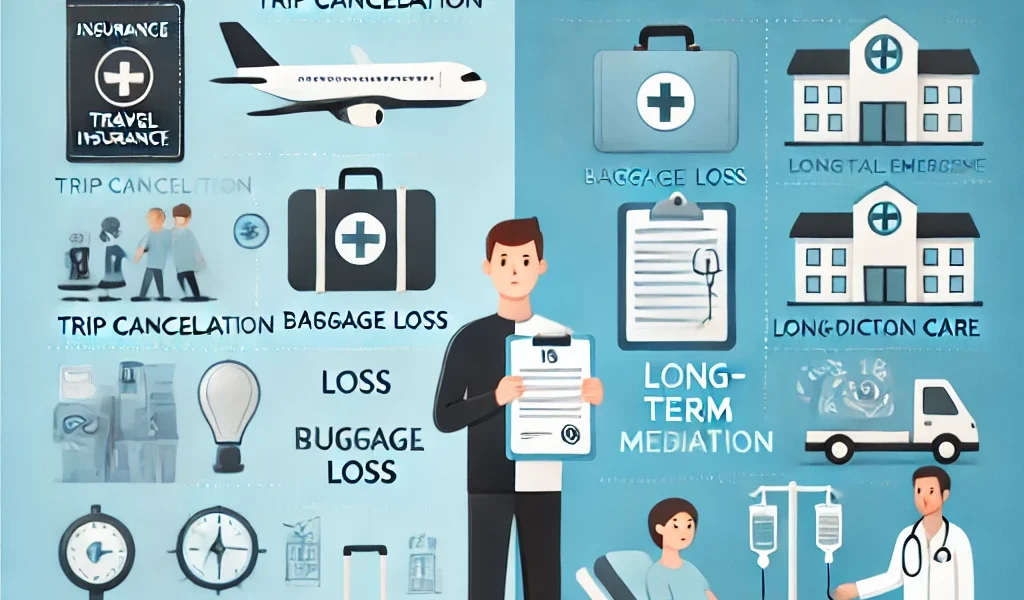Introduction
When planning a trip, many travelers wonder whether travel insurance is necessary if they already have health insurance. The confusion is understandable—both cover medical expenses, but they serve different purposes and provide different types of protection.
Understanding the difference between travel insurance and health insurance is crucial to ensure you are adequately covered during your travels. In this guide, we will break down the key distinctions, what each type of insurance covers, and how to determine which one is right for you.
1. Definition: Travel Insurance vs. Health Insurance
What is Travel Insurance?
Travel insurance is a short-term policy designed to protect travelers from unexpected financial losses and emergencies while traveling. It usually covers a range of travel-related risks, including:
- Medical emergencies abroad
- Trip cancellations or interruptions
- Lost or stolen luggage
- Emergency evacuations
What is Health Insurance?
Health insurance, on the other hand, is a long-term coverage plan that helps individuals cover medical expenses. It typically includes:
- Doctor visits
- Hospital stays
- Prescription medications
- Preventive care (vaccinations, routine check-ups)
💡 Key Difference: Health insurance is designed for ongoing medical care, while travel insurance is for temporary medical emergencies and travel-related risks.
2. Coverage Differences
Medical Coverage
| Coverage Type | Travel Insurance | Health Insurance |
|---|---|---|
| Emergency medical expenses | ✅ Yes | ✅ Yes |
| Routine check-ups | ❌ No | ✅ Yes |
| Pre-existing conditions | ❌ Usually not covered* | ✅ Yes |
| Medical evacuation | ✅ Yes | ❌ No |
| Coverage outside home country | ✅ Yes | ❌ Usually not covered |
➡ *Some travel insurance policies offer coverage for pre-existing conditions if declared beforehand and an additional premium is paid.
Trip-Related Coverage
| Coverage Type | Travel Insurance | Health Insurance |
| Trip cancellation/interruption | ✅ Yes | ❌ No |
| Lost baggage | ✅ Yes | ❌ No |
| Flight delays | ✅ Yes | ❌ No |
| Emergency evacuation | ✅ Yes | ❌ No |
💡 Key Takeaway: Travel insurance offers comprehensive trip protection, while health insurance is only for medical needs.
3. Do You Need Travel Insurance If You Have Health Insurance?
Many travelers assume their health insurance will cover any medical expenses abroad. However, most standard health insurance policies do not cover international medical emergencies.
✅ You need travel insurance if:
- Your health insurance does not cover international treatments.
- You want coverage for trip cancellations, lost baggage, and delays.
- You plan to participate in adventure sports or high-risk activities.
- You are traveling to a remote location with limited medical facilities.
- You need emergency evacuation coverage.
🚫 You may not need additional travel medical coverage if:
- Your health insurance explicitly covers global healthcare.
- You have a credit card that provides travel insurance benefits.
4. How to Choose the Right Coverage
If You Already Have Health Insurance
- Check your policy – Does it cover international medical expenses?
- Check emergency coverage – Does it include medical evacuations and repatriation?
- Look for exclusions – Are there any limitations on overseas hospital stays?
If your health insurance does not provide sufficient coverage, consider getting a travel insurance policy that includes medical coverage.
If You Are Buying Travel Insurance
- Compare policies – Look for medical expense limits and inclusions/exclusions.
- Check for pre-existing condition coverage – Some plans allow add-ons for extra protection.
- Ensure it covers your destination – Some countries have specific entry requirements for travel insurance.
- Choose the right add-ons – If you plan to ski, dive, or hike, make sure adventure sports coverage is included.
5. Which One Should You Get?
| Scenario | Recommended Insurance |
| Traveling internationally | Travel Insurance |
| Long-term stay in a foreign country | Health Insurance with international coverage |
| Adventure activities (scuba diving, skiing) | Travel Insurance with sports coverage |
| Domestic travel with good health coverage | Health Insurance (travel insurance optional) |
| Business trip with non-refundable bookings | Travel Insurance with trip protection |
💡 Pro Tip: Many travelers opt for both—health insurance for long-term coverage and travel insurance for short-term travel protection.
6. Common Myths About Travel & Health Insurance
❌ Myth #1: My regular health insurance covers me anywhere in the world.
✅ Reality: Many health insurance plans have limited or no coverage outside your home country.
❌ Myth #2: Travel insurance covers all medical expenses.
✅ Reality: Travel insurance only covers emergencies, not routine check-ups or pre-existing conditions (unless specified).
❌ Myth #3: If I have travel insurance, I don’t need health insurance.
✅ Reality: Travel insurance is for short-term needs. You still need health insurance for ongoing medical care.
7. Final Verdict: Which Insurance Should You Buy?
- If you travel occasionally, travel insurance is a must-have.
- If you relocate abroad, an international health insurance policy is the best choice.
- If you have pre-existing conditions, verify whether your travel insurance policy covers them.
- If you are on a long-term assignment (e.g., expat, digital nomad), consider a comprehensive health insurance plan with global coverage.
Bottom Line:
💡 Travel insurance is a short-term safety net, while health insurance is a long-term medical security plan.
Conclusion
Understanding the difference between travel insurance and health insurance helps you make an informed decision before your trip. While health insurance is crucial for long-term well-being, it may not cover unexpected travel disruptions, lost luggage, or medical emergencies abroad.
For a worry-free travel experience, investing in a travel insurance policy alongside your health insurance ensures you are fully protected.




